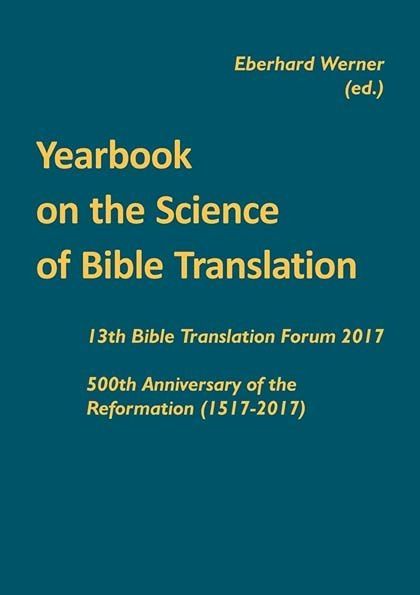Wir verwenden Cookies, um Ihre Erfahrung zu verbessern. Um die neuen Datenschutzrichtlinien zu erfüllen, müssen wir Sie um Ihre Zustimmung für Cookies fragen. Weitere Informationen
Yearbook on the Science of Bible Translation
13th Bible Translation Forum 2017 - 500th Anniversary of the Reformation (1517-2017)
On 17-18th May 2017, the Bible Translation Forum was held at the Karimu Centre in Holzhausen to celebrate the 500th anniversary of the Reformation started by Dr. Martin Luther in Wittenberg. …
17,50 €
Eventuell nicht lagernd - wir versuchen schnell zu besorgen
Alle Preise inkl. MwSt.
Artikelnummer:
860800078
EAN/ISBN:
9783957760784
Produktart:
Bücher
Einband:
Paperback
Maße:
14,6 x 20,9 cm
Umfang:
170 S.
Veröffentlichungsdatum:
22.05.2018
On 17-18th May 2017, the Bible Translation Forum was held at the Karimu Centre in Holzhausen to celebrate the 500th anniversary of the Reformation started by Dr. Martin Luther in Wittenberg.
It is a privilege to introduce topics that are of special interest to the Science of Bible translation: starting with theological questions, Isaiah 53 comes into focus. Important exegetical questions of presupposed knowledge and unexpected information are discussed (Lenart de Regt). A presentation given a few years back is now available, namely Semitic Expressions in the New Testament (Gerhard Tauberschmidt). The Use of the Imperfect in the narrative texts of the New Testament and its consideration in translation forms another area of interest to the Bible translators (Andreas Eichberger). After a presentation of the theological reasoning of existing translation proposals an alternative communicative reading is presented (Ulrich Wendel). The syntactic rules of Plain language is one of the less considered areas in Bible translation, although the need is enormous, regarding the predicted potential readers (Ilga Bliek and Olaf Schmidt-Wischhoefer). The Revision of the Luther Bible 2017 stimulated different discussions. Luther's interpreting and the Luther Bible 2017 is discussed here (Stefan Felber). Missiological questions are presented. The article Uzziah - Inventor of the catapult focuses on the books of 2Chronicles and 2Kings, offering insights on the use and development of catapults (Paul Lawrence). The Czech Bible 21 became especially interesting as the Reformation developed there and this new translation was well received, Between lying and blaspheming: The Czech Bible21 as an attempt at communicative equivalence (Alexandr Flek). The longstanding history of Turkish Bible translations reveals the presence of Christianity during the Ottoman Empire as well as the adventurous paths that Bible translation took in some contexts (Eberhard Werner). The understanding and categorisation of the different varieties of Bible translations, namely Prime-, New-Bible translations and Revisions, help to frame the different approaches taken in Bible translation (Eberhard Werner).
It is a privilege to introduce topics that are of special interest to the Science of Bible translation: starting with theological questions, Isaiah 53 comes into focus. Important exegetical questions of presupposed knowledge and unexpected information are discussed (Lenart de Regt). A presentation given a few years back is now available, namely Semitic Expressions in the New Testament (Gerhard Tauberschmidt). The Use of the Imperfect in the narrative texts of the New Testament and its consideration in translation forms another area of interest to the Bible translators (Andreas Eichberger). After a presentation of the theological reasoning of existing translation proposals an alternative communicative reading is presented (Ulrich Wendel). The syntactic rules of Plain language is one of the less considered areas in Bible translation, although the need is enormous, regarding the predicted potential readers (Ilga Bliek and Olaf Schmidt-Wischhoefer). The Revision of the Luther Bible 2017 stimulated different discussions. Luther's interpreting and the Luther Bible 2017 is discussed here (Stefan Felber). Missiological questions are presented. The article Uzziah - Inventor of the catapult focuses on the books of 2Chronicles and 2Kings, offering insights on the use and development of catapults (Paul Lawrence). The Czech Bible 21 became especially interesting as the Reformation developed there and this new translation was well received, Between lying and blaspheming: The Czech Bible21 as an attempt at communicative equivalence (Alexandr Flek). The longstanding history of Turkish Bible translations reveals the presence of Christianity during the Ottoman Empire as well as the adventurous paths that Bible translation took in some contexts (Eberhard Werner). The understanding and categorisation of the different varieties of Bible translations, namely Prime-, New-Bible translations and Revisions, help to frame the different approaches taken in Bible translation (Eberhard Werner).

